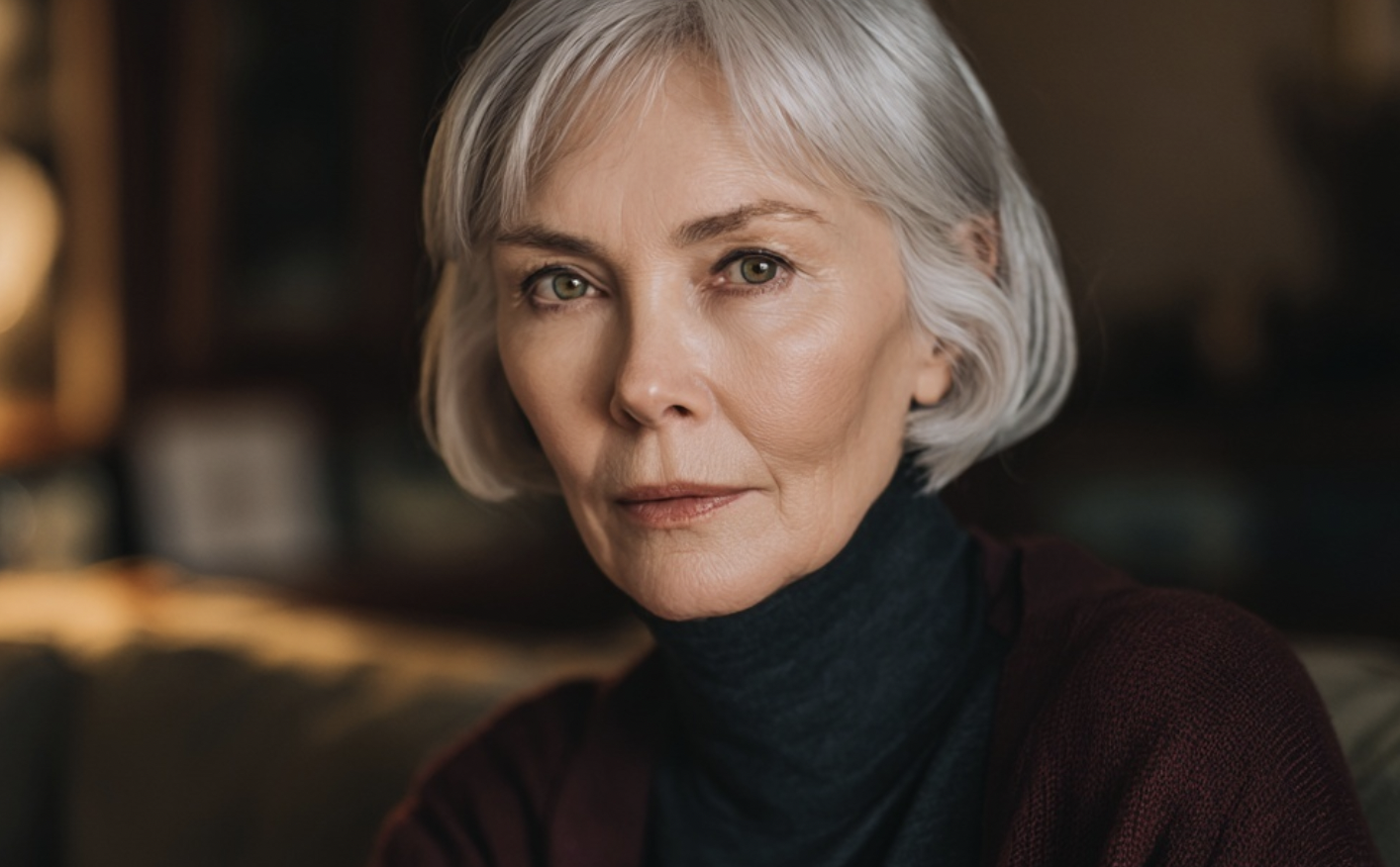The bank’s text pinged in at 7:15 a.m. “Debit transaction in the amount of…” I flicked it away without opening.
Dima was always wiring money for dacha supplies. I barely noticed anymore.
A second alert arrived a minute later. Then a third—while I was filling the kettle. The phone kept buzzing—shrill, relentless, like a fire alarm. Irritation curdled into dread.
I opened the banking app, and my familiar life fell through a trapdoor. Our joint account—the one for the apartment, the car, everything—was stripped bare.
Zero. Absolutely nothing. The savings account—“for old age,” “for the children’s weddings”—drained too. To the last kopeck. Twenty-five years of thrift and planning, gone.
I walked to the bedroom on trembling legs. The bed was made with military stiffness, exactly how Dima preferred it.
His side of the wardrobe yawned like a pulled tooth. Only my dresses remained—bewildered, solitary. No suits, no ridiculous graphic tees. He’d taken the lot.
On the pillow lay a white envelope. Unsealed.
“Anya, forgive me. I’m tired. I want to live for myself while there’s still time. I’ve met someone, and it’s serious. Don’t look for me—don’t call. You’ve got enough for now. You’re smart—you’ll figure it out.”
“For now.” I checked my payroll account. Roughly a hundred thousand sat there.
That, apparently, was what he considered sufficient—after twenty-five years of marriage.
I didn’t cry. The tears lodged somewhere behind my sternum, a hard, icy knot. I moved through the apartment slowly, like a forensic tech at a crime scene. His armchair.
His shelf of “success” books. The framed photo—us with our grown children, all smiles. A stage set. A lie.
He had orchestrated it. He left on a Thursday, knowing I always drove to the dacha on Fridays. He’d given himself a three-day lead. Time to pack up his life and scrub out ours.
I sat at the table and opened my old laptop. Different tab. The one with a password only I knew.
Twenty years ago, after Kirill was born, I inherited a small sum from my grandmother. Dima had waved it off: “Treat yourself—buy dresses.” And I did treat myself. Just not with dresses.
I opened a brokerage account. My secret, my second life. For years I kept double books. Modest earnings from tutoring—“for the soul,” Dima liked to say—money shaved off groceries, any scrap I could spare went there.
Broker messages went to a P.O. box; I kept a separate, hidden email for online access.
Once a year I filed a small, separate return as self-employed. Dima would chuckle.
“Anya, a businesswoman you are not. Your business is the home, the comfort. I’ll make the money.”
He did. Not poorly, but always tight. And I kept quiet. I bought shares, read research at night, reinvested dividends.
My portfolio loaded. The numbers glowed a steady, unblinking green. I looked at a seven-figure sum—in dollars—and at my husband’s pathetic note.
He believed that by taking everything he’d destroyed me. But he’d overlooked one detail. He never knew I’d been building an ark all these years. And now that his flood had arrived, I realized I was standing on the deck of an ocean liner.
I smirked—for the first time that morning.
First, I called the kids. Kirill and Olya appeared on video, cheerful and unsuspecting.
“Hey, Mom! Where’s Dad—off fishing again?” Kirill joked.
I drew a breath. Calm, even, I told them everything: the emptied accounts, the hollow closet, the note.
Kirill’s smile fell away. Olya pressed a hand to her mouth.
“He… took everything?” Kirill asked, steel creeping into his voice. “Mom, do you have money? I’m coming over.”
“I’m fine, sweetheart. There’s money, don’t worry. I just wanted you to hear it from me.”
“Did he call? Say anything?” Olya’s voice shook. “Could it be a mistake?”
I shook my head. No mistake. Just clean, cold arithmetic.
After the call, I ordered the locks changed. Then I rang the bank and blocked all third-party access. Toward evening Dima’s number flashed. I let it ring almost out, then answered.
“Yes.”
“Hi,” he said, chipper, almost merry. “So, how are you? Not panicking?”
I said nothing.
“Anya, what’s with the silence? I’m being reasonable here. Listen—straight to business. The car’s registered to you. I need you to swing by tomorrow and sign a deed of gift. I’ll text the address.”
“I’m not coming.”
A beat of stunned air.
“What do you mean? Don’t start. I need the car.”
“It’s marital property, Dima. Purchased during the marriage.”
He laughed—an ugly sound.
“Oh, now you remember the marriage? Don’t complicate this. Just sign.”
“I won’t sign anything until I speak to a lawyer.”
That hit him. Me—soft, homey Anya—saying lawyer.
“What lawyer? Have you lost it? I took what I earned! I left you the apartment! Be grateful and don’t do anything stupid.”
“The apartment purchased with my parents’ money.”
“Enough!” he barked. “Tomorrow, ten o’clock. If you don’t show—your problem. You know me.”
He hung up. He was certain I’d fold. But the Anya who would have folded died that morning. I opened the laptop and typed: “Best divorce lawyer.”
Marina Sergeyevna had a gaze like a scalpel and hair to match. She listened, scanned the statements.
“It’s a mess, Anna,” she said. “Proving deliberate siphoning is difficult. Could take years. We’ll move to freeze assets, but if he’s already funneled everything to the new flame…”
“What do you recommend?”
“Start with filing for divorce and dividing property—the car, the dacha. We’ll fight for the money. For now: no sudden moves. He’ll try to provoke you. Wait.”
That evening Kirill called.
“Mom, Dad rang me. Said you’d lost your mind, hired a lawyer to strip him to the bone. Said you’ve always been a spendthrift and he was the saver. He asked us to ‘talk sense into our mother.’”
Classic Dima—press the bruise. Use the children.
“And Olya?”
“She told him to get lost. I tried to reason with him… You know what he said? ‘You’ll come crawling back when your mother leaves you without pants.’”
There it was—the point of no return. He went for the only thing I had left: my children’s trust.
Enough. No more defense. Only offense.
I opened my brokerage account. My quiet life. My secret. Time to make it a weapon.
I sold a small slice of my holdings. The cash that landed in my account equaled Dima’s annual income.
Then I found the best private investigator I could.
“Good afternoon. I need everything on a man: Dmitry Volkov. And on his companion, Kristina. All you can find—accounts, real estate, business ventures, debts. Especially debts. Price is no object.”
His game was over. Mine was beginning.
A week later, the first report lay on my desk. The investigator confirmed it: every ruble had been poured into Kristina’s beauty salon.
A failing salon. Inflated by Dima’s dream of “his business,” he’d thrown in everything and even convinced Kristina to take a loan against her apartment.
The investigator dug deeper—old unpaid debts to former partners surfaced.
I slid the folder across to Marina. She paged through, and a predatory smile nicked the corner of her mouth.
“Well then, Anna. The board is turning. We have leverage.”
Our plan was simple. Elegant. It took nearly a month. Through a financial consultant Marina hired, we approached Dima’s former creditors—angry, cheated people.
We offered to buy the debt. All of it, interest included. They could barely believe their luck.
Now Dima didn’t owe them. He owed an anonymous investment fund. In other words: me.
At the same time, through an intermediary company, Marina’s team began purchasing the salon’s arrears—supplier invoices, back rent. Step by step, the ring around his new life narrowed.
He showed up a month later—no call, just stormed in. Ravaged, older by ten years.
“What’s happening, Anya?” he hissed from the entryway. “Why are collectors calling me?”
I went to the kitchen. “I don’t know what you mean. This is your new life, Dima.”
“Don’t play the fool! It’s you! Where did you get that kind of money?”
I laughed.
“There’s only one thief here—and it isn’t me. I… invested. For twenty years.”
I turned the laptop so he could see. He stared at the figures. The color drained from his face. Understanding dawned.
“That’s… that’s impossible…”
“It’s possible. While you told me my place was the kitchen, I was earning. More than you imagined.
And now your debts—and your darling’s—are mine. Your tidy little life is mine. And I can switch it off.” I snapped my fingers.
He sagged into a chair, eyes wide with animal fear.
“Anya… Anechka… forgive me. I was a fool. I’ll leave her now! We’re a family—”
The front door opened. The kids walked in.
“Dad?” Kirill’s face was cold, not furious—colder. “What are you doing here?”
“Son… Olya… talk to your mother! She’s trying to destroy us!”
Olya came to stand behind me, a steady hand on my shoulder.
“You destroyed us, Dad. The day you robbed Mom and ran. Leave. We don’t speak to you anymore.”
Dima looked from one icy face to the other, a stranger in his own story. He rose, unsteady, and shuffled to the door. He turned in the frame.
“Anya… I love you…”
I only smirked.
A year later.
I sat on the terrace of my new home, pine forest spilling to the horizon. A tablet with stock charts lay on my knees. No more secrets. This was my work now.
I didn’t crush the salon. I sold its debts to a specialist agency; they put it to auction quickly.
Kristina’s apartment went to the bank. Whatever became of them afterward wasn’t my concern. I wrote him off like a bad investment.
I sold the car and bought Olya a trip to Italy with the proceeds. Kirill, with my help, launched a small IT firm. We grew closer than we’d ever been.
Sometimes I thought of Dima. Not with anger—no. With a chill curiosity. He believed strength lived in money you could seize.
He never understood that real strength lives in the ability to create it. In knowledge, discipline, patience. In what cannot be taken.
My divorce wasn’t a revenge tale. It was a liberation. Not from my husband.
From that quiet, accommodating Anya I had played for twenty-five years—the woman who hid her mind behind the title of “keeper of the hearth.”
The phone on the table buzzed. Olya’s smiling face, the Colosseum behind her, filled the screen.
“Hi, Mom! It’s amazing here! Thank you!”
“I’m so happy for you, sweetheart.”
We chatted a few minutes. When I hung up, I looked out at the forest and realized that for the first time in years, I was truly happy.
Not because I had a lot of money. Because I had finally become myself.



